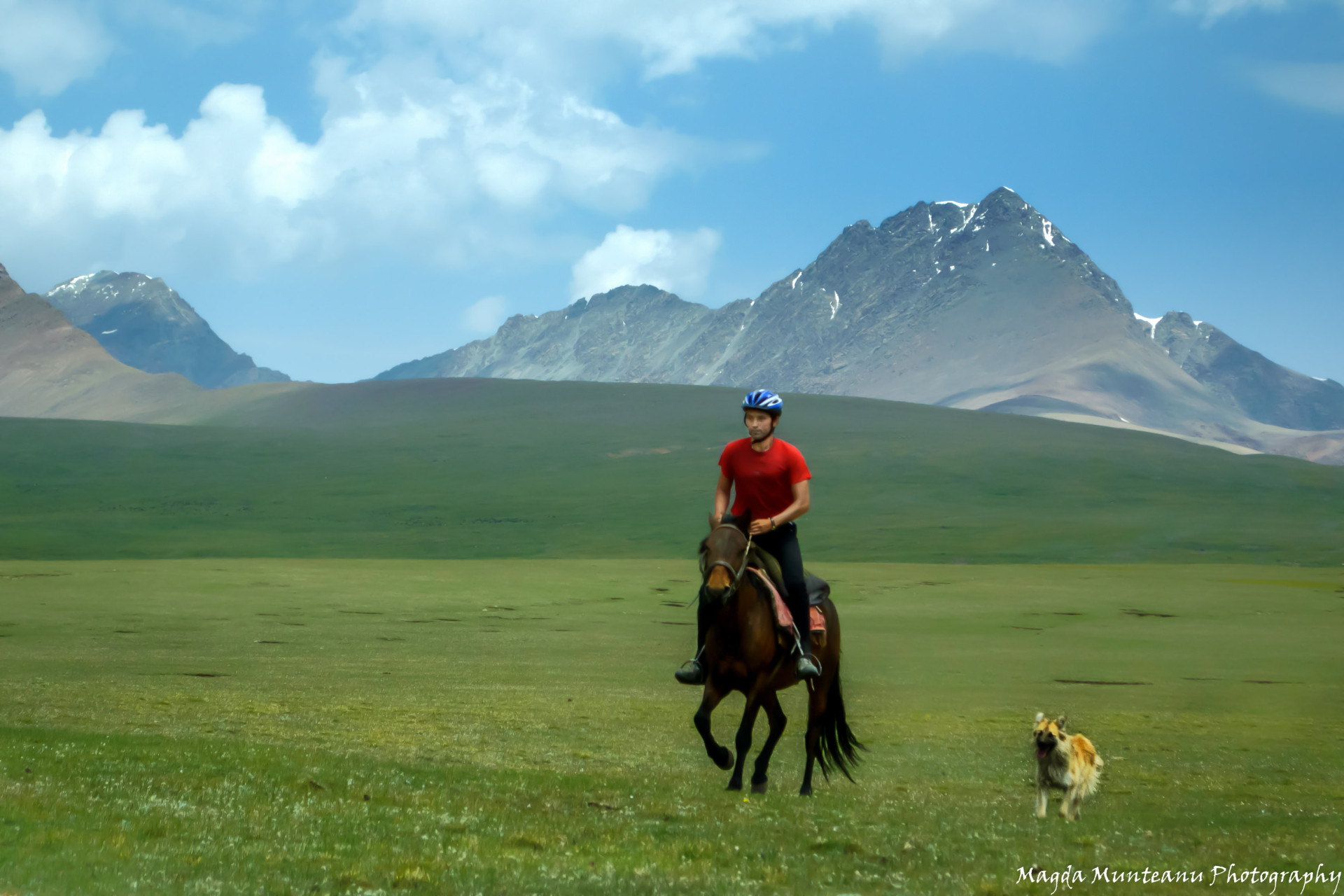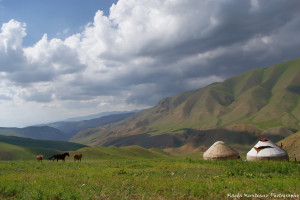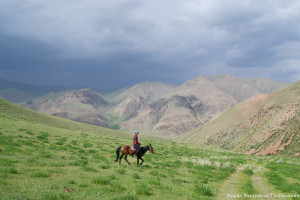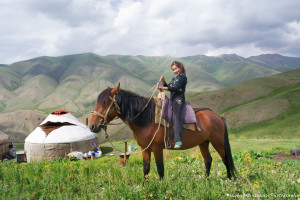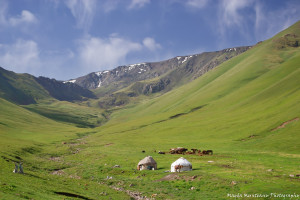In a few seconds I’ll see the meadows of Sarala-Saz. Vast, overwhelmingly green, surrounded by 4,000 meter high mountains. The horse senses my emotion and neighs. We start galloping. Fast. Faster. The wind blows in my hair. Faster. We jump over a ditch. The others are far behind. It’s just me and my horse. And the mountains. In an empty and unknown land in Central Asia. I let the horse run as fast as he can. My legs start shaking. It’s dangerous. It’s beautiful. I can’t stop. I don’t want to stop. This is the moment I’ve been dreaming of my whole life.
It’s our third day of horse riding in Kyrgyzstan. I had no idea what I’d find here. What’s your idea of Bishkek? Have you ever heard of Bishkek? It’s the capital and the largest city of Kyrgyzstan. To my shame, I have to admit I expected to see a New Delhi style city.
The moment we arrived there, we had the strange feeling of going back in time. Back to a familiar place. Back to Bucharest in the early 90s, full of communist buildings and statues, gray blocks and old cars, yet combined with fancy malls, international brands and hundreds of Toyota Land Cruisers. Kyrgyz people go to work in Russia and, when they come back, they buy cars. “You have only one car?” our guide asked astonished. “You poor guys. I have four. My br other has five,” he says. The newest dates from 2001.
Mairam-Bek talks. And talks. Ormun listens. And laughs. Then talks. And talks. Mairam-Bek laughs. Then talks. For hours. They ride slowly, their horses carrying all our backpacks and equipment. They are our guides and are supposed to lead the way and be our teachers. When we first met them, three days ago, they gave us the horses and said: “Now ride. To make the horse go you say ‘Chu’ and to stop you say ‘Dirrr’.”
That was it. I was terrified. I knew we had to cover at least 1,000 meters in altitude a day and stay in the saddle for five to six hours. I looked at my horse. “Your name will be Mishu,” I told him. His eyes were gentle. He wasn’t tall, which I thought was comforting in case I should fall. His reins were made of rope and the saddle was tied with a belt and covered with a blanket. I felt as if I was learning how to drive on an old Dacia 1100. Once you know how to drive that car, you can drive any car, I told myself.
To our surprise, the strategy worked. The horses were so calm and confident that they became our teachers themselves. We crossed a glacier river. Then another one. And another. We climbed over steep rocks. We went on narrow trails. I learned to trust my horse. I began to like him. And talk to him. I liked the way he moved his ears to hear me speak.
It is almost 5 pm. I am so tired. Seven hours of horse riding in Kyrgyzstan. Two mountains crossed. My legs are shaking and I am almost afraid to dismount, to avoid the embarrassing situation of failing to stand. It’s cold and windy. The stormy clouds above us don’t cheer me up. I see the two yurts in the distance. With a final effort, I gallop uphill on the narrow trail.
Ahklai comes to greet us, on her father’s big brown horse. Her eyes glitter with joy when she laughs and says “Hello” in English. She’s nine. She’s not allowed to ride that horse, but she wanted to see the two Europeans that would sleep in her yurt. Her mother is inside, preparing the tea. I take my shoes off and enter. It’s warm. So warm. And it smells good. The colored, hand-made carpets on the floor and on the wooden walls give a cozy feeling of intimacy. It takes five people only one hour to build a yurt.
We sit down on pillows, around the table. The mother pours us black tea into small bowls. They are only half full, to allow us to be polite and ask for a refill several times. The two little boys start a fight. The big sister puts some more horse manure into the stove. Suddenly, we hear shooting at the entrance. “You can relax. The wolf won’t come tonight,” says the father entering the yurt. A normal evening in the mountains.
The whole family lives here five months a year. They take care of 800 sheep, 20 horses and 30 cows. The parents smile at each other and the little girl keeps jumping on her father’s knees. “Here, take some ‘karmaz’,” the mother says and hands me a bowl full of cold milk. I drink a little and almost spit it. It tastes sour, awful. It’s the Kyrgyz national drink: fermented horse milk, with two percent alcohol. Everybody drinks it, even two-year-old kids. When Kyrgyz people have visitors, it’s mandatory to offer them karmaz.
Last day of horse riding in Kyrgyzstan. I can’t believe how fast our riding days have gone. I smile when I remember how afraid I was of my little horse. Today I’ve run over meadows full of edelweiss. There were so many of them that horses were eating them.
It’s almost dark. I kiss Mishu good bye. Tears burst into my eyes. I’ve grown fond of him. I know I shouldn’t have had to, because tomorrow he will be with other tourists. As I go into my tent, I hear a neigh nearby. It’s Mishu. He looks at me. His eyes are gentle. I feel the tears returning and I turn my head quickly away from him.
The night is calm. I fall asleep surrounded by horses, sheep and cows. Soon, very soon, I will have my own Mishu. I smile in my dream.
